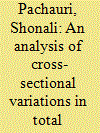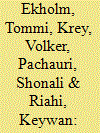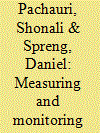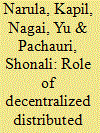|
|
|
Sort Order |
|
|
|
Items / Page
|
|
|
|
|
|
|
| Srl | Item |
| 1 |
ID:
052298


|
|
|
|
|
| Publication |
Oct 2004.
|
| Summary/Abstract |
Using micro level household survey data from India, we analyse the variation in the pattern and quantum of household energy requirements, both direct and indirect, and the factors causing such variation. An econometric analysis using household survey data from India for the year 1993–1994 reveals that household socio-economic, demographic, geographic, family and dwelling attributes influence the total household energy requirements. There are also large variations in the pattern of energy requirements across households belonging to different expenditure classes. Results from the econometric estimation show that total household expenditure or income level is the most important explanatory variable causing variation in energy requirements across households. In addition, the size of the household dwelling and the age of the head of the household are related to higher household energy requirements. In contrast, the number of members in the household and literacy of the head are associated with lower household energy requirements.
|
|
|
|
|
|
|
|
|
|
|
|
|
|
|
|
| 2 |
ID:
098610


|
|
|
|
|
| Publication |
2010.
|
| Summary/Abstract |
Improving access to affordable modern energy is critical to improving living standards in the developing world. Rural households in India, in particular, are almost entirely reliant on traditional biomass for their basic cooking energy needs. This has adverse effects on their health and productivity, and also causes environmental degradation. This study presents a new generic modelling approach, with a focus on cooking fuel choices, and explores response strategies for energy poverty eradication in India. The modelling approach analyzes the determinants of fuel consumption choices for heterogeneous household groups, incorporating the effect of income distributions and traditionally more intangible factors such as preferences and private discount rates. The methodology is used to develop alternate future scenarios that explore how different policy mechanisms such as fuel subsidies and micro-financing can enhance the diffusion of modern, more efficient, energy sources in India.
|
|
|
|
|
|
|
|
|
|
|
|
|
|
|
|
| 3 |
ID:
098604


|
|
|
|
|
| Publication |
2010.
|
| Summary/Abstract |
A lack of access to energy and, in particular, electricity is a less obvious manifestation of poverty but arguably one of the most important. This paper investigates the extent to which electricity access can be investigated using night-time light satellite data and spatially explicit population datasets to compare electricity access between 1990 and 2000. We present here the first satellite derived estimates of rural population without access to electricity in developing countries to draw insights on issues surrounding the delivery of electricity to populations in rural areas. The paper provides additional evidence of the slow progress in expansion of energy access to households in Sub-Saharan Africa and shows how this might be ascribed in part due to the low population densities in rural areas. The fact that this is a continent with some of the lowest per-capita income levels aggravates the intrinsic difficulties associated with making the investments needed to supply electricity in areas with low population density and high dispersion. Clearly, these spatial dimensions of the distributions of the remaining unelectrified populations in the world have an impact on what options are considered the most appropriate in expanding access to these households and the relative attractiveness of decentralized options.
|
|
|
|
|
|
|
|
|
|
|
|
|
|
|
|
| 4 |
ID:
110690


|
|
|
|
|
| Publication |
2011.
|
| Summary/Abstract |
A major energy challenge of the 21st century is the health and welfare of 2.7 billion people worldwide, who currently rely on burning biomass in traditional household cooking systems. This Special Issue on Clean Cooking Fuels and Technologies in Developing Economies builds upon an IAEE workshop on this subject, held in Istanbul in 2008 (Foell et al., 2008). It includes several papers from that workshop plus papers commissioned afterwards. The major themes of that workshop and this Special Issue are:
•
Analytical and decision frameworks for analysis and policy development for clean cooking fuels.
•
Making energy provisioning a central component of development strategies.
•
Strategies/business models of suppliers of modern fuels and technologies.
•
Analysis of successes/failures of past policies and programs to improve access to clean cooking.
This introductory paper serves as a preamble to the 11 papers in this Special Issue. It provides a brief background on household cooking fuels and technologies, including: (1) their implications for sustainable development, health and welfare, gender impacts, and environment/climate issues; (2) options and scenarios for improved household cooling systems; and (3) discussions of institutions, programs and markets. It closes with "Research and Action Agendas", initially developed during the 2008 workshop.
|
|
|
|
|
|
|
|
|
|
|
|
|
|
|
|
| 5 |
ID:
110691


|
|
|
|
|
| Publication |
2011.
|
| Summary/Abstract |
This article undertakes a review of alternative measures and indicators of energy poverty targeted to specific audiences and for particular purposes. At the national and international scales there have been some efforts for constructing measures of energy poverty. However, much more needs to be done to develop an internationally consistent measurement framework and to put in place data collection systems that will enable regular reporting. At the programme and project level, indicator systems by necessity need to be designed for specific purposes. Nevertheless, the article proposes that in many instances it is desirable to widen the scope of metrics used for designing and evaluating policies and programmes. In the past, monitoring and evaluation indicators have focused largely on outputs, service delivery or dissemination. Central to the recommendations laid out in the paper is the call for widening the focus of evaluation and necessity to design indicators that adequately assess the needs of beneficiaries and describe the living conditions of families and communities, who are targeted by such programmes and initiatives.
|
|
|
|
|
|
|
|
|
|
|
|
|
|
|
|
| 6 |
ID:
114319


|
|
|
|
|
| Publication |
2012.
|
| Summary/Abstract |
This study is motivated by the goal of achieving 'Universal Energy Access' by 2030 and looks at electricity access for rural households in the South Asian region. The 'MESSAGE-Access' model is employed to assess the cost effectiveness of centralized and Decentralized Distributed Generation (DDG) technologies. Delivery mechanisms are modelled to include mini-grid and stand-alone systems and the analysis includes an estimation of rural household electricity demand from lighting and appliances. We assume two future demand scenarios with a 'minimum threshold' and a 'higher threshold' of electricity consumption of 65 and 420 kW h per household per year, respectively. We find that the cost of delivering electricity by centralized generation and grid distribution is up to four times the cost of stand-alone and mini-grid DDG options in the case of 'minimum threshold' demand scenario. These results are robust to alternate assumptions regarding costs of technologies. We also estimate that public subsidy bill for kerosene can be substantially reduced if all households switch to electricity as their primary source of lighting. Thus, promoting DDG options can reduce capital investments needed to meet access goals significantly and have an important role to play, in meeting the goal of universal electrification by 2030.
|
|
|
|
|
|
|
|
|
|
|
|
|
|
|
|
|
|
|
|
|